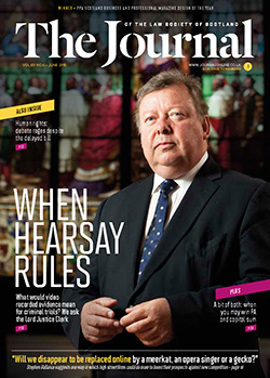Learning opportunity

Sometimes the opportunity to learn lessons from a claim is missed, and when this happens it is often because the circumstances of the claim are dismissed as unique or very unlikely to recur. Sometimes a fatalistic conclusion has been drawn, that the situation couldn’t have been avoided no matter what could have been done differently: “The best risk management in the world wouldn’t have avoided this situation arising.”
While occasionally this may be a justified conclusion, most of the time it may be possible to achieve some benefit in terms of risk improvement by reviewing the circumstances that resulted in the claim and analysing the underlying causes and contributory factors. Let’s consider an example.
Case study
Solicitors were engaged by commercial clients to advise them on various property and employment implications of the planned rationalisation of their business. As part of this process, an assistant in the firm’s property team had given advice on aspects of the company’s property leases. Some time later, the assistant received an email from the client which included an instruction regarding the tenancy of one of their premises in the following terms:
“At our recent meeting we discussed various property matters including the possibility of terminating the tenancy of one of our sites. Following discussions here, we have now decided to terminate that tenancy.
“To do that, you advised that we need to serve a notice on the landlord and this needs to be done no later than 14 July. That date is fast approaching but I understand from our conversation that this is pretty straightforward. Can you please now go ahead and serve the notice in advance of 14 July.”
The assistant was particularly busy on a major transaction at the time, and passed the instruction to a team colleague to action. Notice was duly served on the landlord on 12 July. A few days later, the assistant was horrified when a letter arrived from the landlord’s agents advising that the notice had been served too late – the deadline had in fact been 4 July – not 14 July.
Analysis
From the brief facts of this case study, we don’t know the final outcome. Was the landlord willing to accept the break notice albeit late? In an improving property market, perhaps the landlord was delighted to get vacant possession, enabling the landlord to redevelop, relet, or sell the premises. Or were the firm’s clients committed to the premises, contrary to their wishes, for a further term, with all the rental, insurance, and maintenance commitments the clients had expected to be free of? In that event, do the clients have any recourse against their solicitors, or were the clients perhaps the authors of their own misfortune?
At best, if there is an answer to any allegation of fault on the part of the solicitors, this may prove to have been a “near miss”. However, if there is a basis for a valid claim against the solicitors, this could be a very costly claim. Potentially, the annual rent and other annual outgoings over the unwanted further term of the tenancy could add up to a significant claim. In either event, it is well worth considering what lessons can be learned with a view to minimising the risk of a recurrence which, next time, could foreseeably result in a costly claim or the loss of an important client.
The brief summary tells us little or nothing about the true cause(s) of what went wrong. For the exercise to be effective, it would be necessary to know more about the facts and circumstances:
- Did the assistant give the incorrect date when the break option was discussed at the meeting?
- Or did the assistant just give an example when discussing the break option at the meeting and the dates mentioned were purely illustrative?
- Did the client make an error in noting the date mentioned by the assistant at the meeting?
- Did the assistant rely on or fail to check the date mentioned in the client’s email when passing the file on?
- Did the assistant or their colleague check the correct deadline for service of the notice by reference to the lease?
- Had the deadline already passed by the time the client instructed the firm to proceed with service of the notice?
Lessons
The case study illustrates the range of risks and the different ways in which a critical date could be missed, even in an apparently routine instruction. In addition to the drafting and other technical aspects of the instruction, there may be issues of reliance on one’s recollection of (or assumptions about) the precise terms of lease provisions or key dates, or making the assumption that a client will understand the specific terms and implications of a lease provision, and the need for certain action to be taken timeously to protect their interests.
Is this situation the firm’s “fault”? Possibly, or possibly not. Has the client incorrectly noted the key date and/or instructed the firm too late? However, the firm clearly wants to minimise the risk of having a dissatisfied client. How to minimise the risk for the client and the firm?
Preventing recurrence
A number of potential action points might be justified, depending on the conclusions of the review and analysis – for example:
- Targeted training, focused on this specific area of risk.
- Amendment of the firm’s standard documents (terms of engagement or scoping letters).
- Possible introduction of a “sign-off letter” (issued at a key point in an engagement highlighting key dates/actions).
- Introduction of relevant checklists to prompt consideration of key issues and critical dates.
- File review or file audit to establish how colleagues are addressing critical date issues.
- A requirement that any enquiry regarding break options must be responded to as a matter of priority.
Action plan
The value of conducting this sort of analysis and devising a preventive action plan aimed at minimising the risk of recurrence may be limited if actions are not clearly defined and measurable or if responsibilities are not allocated and implementation reviewed. The following points should be considered as part of this process:
Responsibility
Action points require responsibility to be allocated. Assigning responsibility to “all fee earners” risks everyone assuming that someone else is taking responsibility – with the result that no one takes any action at all.
Completion and review dates
As with any business goal, establishing a schedule for implementation improves the prospect of the action plan being fully and successfully implemented, for example, by ensuring that a training initiative reaches recent recruits, or that a change in the firm’s procedures is actually implemented across different offices, teams, or practice areas.
Conclusion
Considerable efforts have been made across the profession to enhance risk awareness and risk controls over recent years. As a result of those efforts, many practices have succeeded in maintaining a consistently claims-free record over an extended period. Other practices can take satisfaction from the fact that their efforts have kept claims to a minimum. Avoiding repetition of an error or omission is an essential objective of risk management, and this is achievable by adopting a methodical and action-based approach to learning from claims.
Alistair Sim and Marsh
Alistair Sim is a former solicitor in private practice, who works in the FINPRO (Financial and Professional) National Practice at Marsh, a global leader in insurance broking and risk management. To contact Alistair, please email alistair.j.sim@marsh.com
The information contained in this article provides only a general overview of subjects covered, is not intended to be taken as advice regarding any individual situation and should not be relied upon as such. Insureds should consult their insurance and legal advisers regarding specific coverage issues.
Marsh Ltd is authorised and regulated by the Financial Conduct Authority.
In this issue
- Weighing the risks
- Private parking fines – are they enforceable?
- Scotland – home of (dangerous) golf
- Shareholder details: the right to refuse
- Perils of the owner-occupied croft (fuller version)
- Reading for pleasure
- Opinion: Thomas Ross
- Book reviews
- Profile
- President's column
- Land Register completion: one year in
- People on the move
- Rights: whose final say?
- The word on the street
- Screen test
- Making the best of mediation
- Keep up the payments
- The right priorities
- When reputation is not enough…
- Sports justice – being seen to be done?
- Source of disputes
- CML Handbook: the new deal
- Perils of the owner-occupied croft
- In-house and in-tune in the Commonwealth
- Stair Society seeks new blood
- New Build Standard Clauses revised
- Law reform roundup
- Leven's last hole rarely in benevolent mood
- Year of the new look
- AML just became simpler
- "My time is valuable!" Oh really?
- Learning opportunity
- Ask Ash
- Technology: slave or master?






